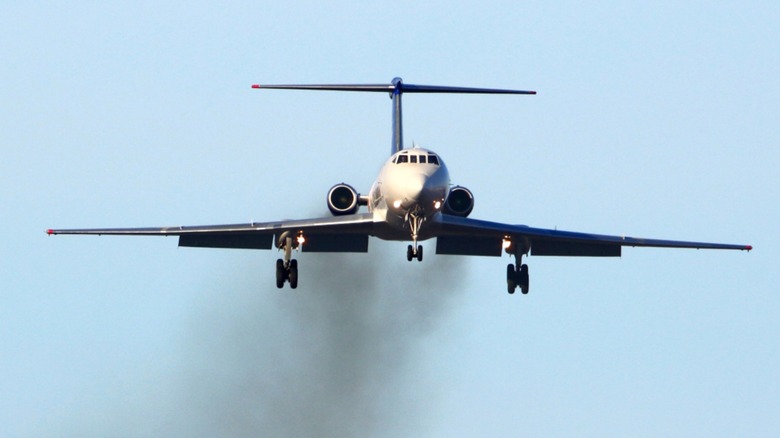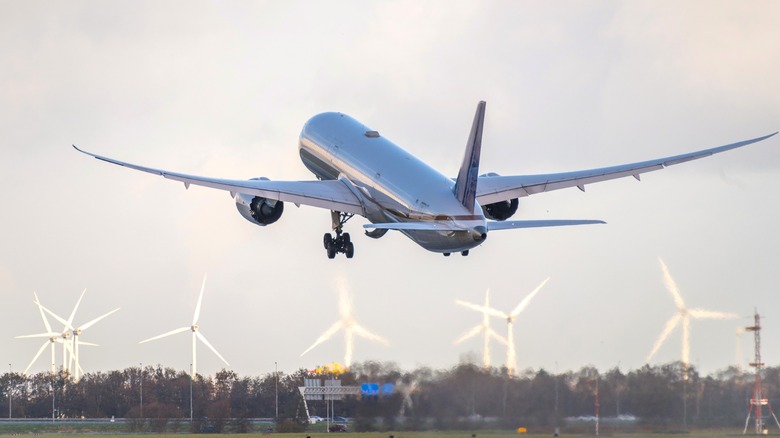Rick Steves Shares His Unpopular Take On The Phenomenon Of 'Flight Shaming'
Climate activist Greta Thunberg helped popularize the term flygskam, or "flight shame," a reference to the aviation industry's carbon dioxide emissions, which reached 70.6 million metric tons in June 2024. Proponents of "flight shame" argue that air travel is a wasteful indulgence that contributes to climate change, and their view has had some influence. In 2019, a Union Bank of Switzerland survey of over 6,000 people across the UK, US, France, and Germany found that 21% of respondents had reduced their number of flights in the last year. Traction behind "flight shame" grew so intense around this time that the BBC speculated that it could end up halving air traffic growth.
However, some famous figures — including travel writer and broadcaster Rick Steves — urge against "flight shaming," despite their concerns for the climate. Steves has spent the last 50 years traveling from North America to Europe and beyond, publishing tips on a wide range of subjects, including his favorite place to visit before Christmas, the best ways to overcome language barriers, and budget-friendly ways to enjoy European cities.
Steves' career has racked up countless miles as well as a substantial carbon footprint, presenting the affable explorer with a dilemma, to which his solution is not prohibition but mitigation through the Europe Climate Smart Commitment.
Flight shaming and Rick Steves' Europe Climate Smart Commitment
Rick Steves doesn't want anyone to be shamed out of traveling because of the great value it can have in spreading positive ideas across the world. "When we travel, we become a force for peace and sustainability in the world," Steves told the Harvard Business Review. "We help our country fit into the family of nations. We come home with a broader perspective and can help others be enthusiastic about building bridges instead of walls."
Of course, the flight shame-inclined are liable to point fingers at the carbon footprint of Steves' love of travel. A lifelong resident of Edmonds, Washington, a return flight from Seattle to London would emit roughly 2.08 metric tons of carbon dioxide. A return flight to New Delhi, the capital of Rick Steves' favorite country, would add another ton, for a total of approximately 3.06 metric tons. Then there's Steves' tour company, which sends 30,000 Americans across the Atlantic to Europe and back every year.
Steves laments the absence of a carbon tax in the United States, so he has imposed one on himself. Every year, Steves allocates $1 million — roughly $30 per traveler — to a dozen non-profit organizations that promote climate-friendly agriculture across the developing world. This way, Steves says, his travelers can experience the world while also contributing to its preservation.
Steves' critics and defenders
Rick Steves describes his business as a "climate-smart tour company." Despite his efforts, however, his yearly million-dollar donations have attracted criticism. One commenter on the Steves' Facebook page wrote that the broadcaster was funneling cash to poor farmers who had to deal with the consequences of wealthy people's damaging lifestyles. Another critic, a solar energy consultant, commented that a travel company could never be carbon neutral and that it was not possible to pay carbon emissions away.
University of Washington professor Aseem Prakash — founder of the Environmental Politics and Governance network — weighed in on the matter with a pragmatic view of Steves' initiative. He stated that the only meaningful solution to cutting aviation emissions is to reduce air travel, but Steves' carbon tax is better than doing nothing. "Economics says that he's now paying closer to the true external costs of his activities — he's paying for the pollution," Prakash told the Seattle Times. "Because of that, he may have to start charging more, and then people will travel less, at least with Rick Steves."


